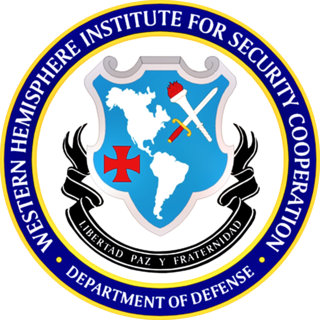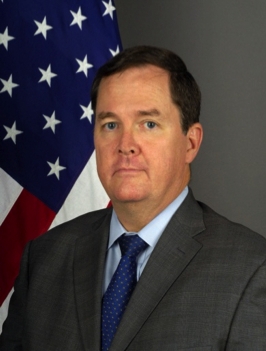
The Organization of American States is an international organization founded on 30 April 1948 to promote cooperation among its member states within the Americas.

The Western Hemisphere Institute for Security Cooperation (WHINSEC), formerly known as the School of the Americas, is a United States Department of Defense school located at Fort Moore in Columbus, Georgia, renamed in the 2001 National Defense Authorization Act.

The Edmund A. Walsh School of Foreign Service (SFS) is the school of international relations at Georgetown University in Washington, D.C. It is consistently ranked among the world's leading international affairs schools, granting degrees at both undergraduate and graduate levels. Notable alumni include former U.S. president Bill Clinton, former CIA director George Tenet, and King Felipe VI of Spain, as well as numerous other heads of state or government. Its faculty has also included many distinguished figures in international affairs, such as former U.S. secretary of state Madeleine Albright, former U.S. secretary of defense Chuck Hagel, and former president of Poland Aleksander Kwaśniewski. It is considered to be one of the main recruiting grounds for the Central Intelligence Agency (CIA) of the United States.

The Inter-American Treaty of Reciprocal Assistance is an agreement signed in 1947 in Rio de Janeiro among many countries of the Americas. The central principle contained in its articles is that an attack against one is to be considered an attack against them all; this was known as the "hemispheric defense" doctrine. Despite this, several members have breached the treaty on multiple occasions. The treaty was initially created in 1947 and came into force in 1948, in accordance with Article 22 of the treaty. The Bahamas was the most recent country to sign and ratify it in 1982.

José Miguel Insulza Salinas is a Chilean politician, lawyer, and academic serving as a senator for the Arica y Parinacota Region since 2018. He previously served as Minister of Foreign Affairs from 1994 to 1999 and Minister Secretary-General of the Presidency from 1999 to 2000 under president Eduardo Frei Ruiz-Tagle, as Minister of the Interior from 2000 to 2005 under president Ricardo Lagos, and as Secretary General of the Organization of American States from 2005 to 2015.

The Johnson Doctrine, enunciated by U.S. President Lyndon B. Johnson after the United States' intervention in the Dominican Republic in 1965, declared that domestic revolution in the Western Hemisphere would no longer be a local matter when the object is the establishment of a "Communist dictatorship". During Johnson's presidency, the United States again began interfering in the affairs of sovereign nations, particularly Latin America. The Johnson Doctrine is the formal declaration of the intention of the United States to intervene in such affairs. It is an extension of the Eisenhower and Kennedy Doctrines.

Edmund Aloysius Walsh was an American Roman Catholic priest of the Society of Jesus and career diplomat from South Boston, Massachusetts. He was also an author, professor of geopolitics and founder of the Georgetown University School of Foreign Service, the first school for international affairs ever founded in the United States. He founded the school in 1919–six years before the U.S. Foreign Service itself even existed–and served as its first regent.

Arturo A. Valenzuela is a Chilean-American academic who was the United States Assistant Secretary of State for Western Hemisphere Affairs from November 5, 2009, until August 2011. His confirmation had been blocked by Senator Jim DeMint due to a dispute over President Barack Obama's approach to the 2009 Honduran constitutional crisis. He previously served as Professor of Government and Director of the Center for Latin American Studies in the Edmund A. Walsh School of Foreign Service at Georgetown University. He was previously Professor of Political Science and Director of the Council on Latin American Studies at Duke University. In May 2011 it was reported that Valenzuela would be leaving his government post later that summer to return to his academic activities. He officially left office at the end of August 2011.

The Inter-American Dialogue, also known as the Dialogue or IAD, is a U.S.-based think tank in the field of international affairs primarily related to the Western Hemisphere. Headquartered in Washington, D.C it intends to "foster democratic governance, prosperity, and social equity in Latin America and the Caribbean". The Dialogue's research areas focus on the rule of law, education, migration, remittances, energy, climate change and extractive industries.

The McCourt School of Public Policy is one of ten constituent schools of Georgetown University. The McCourt School offers master's degrees in public policy, international development policy, policy management, data science for public policy, and policy leadership as well as administers several professional certificate programs and houses fifteen affiliated research centers. The McCourt School has twenty-one full-time faculty members, ten visiting faculty members, more than one-hundred adjunct faculty members and approximately 450 enrolled students across the various degree and executive education programs.
The Rose Institute of State and Local Government is a research institute based out of Claremont McKenna College in Claremont, California. Founded in 1973, the Institute is particularly well known for its expertise in elections, demographics, fiscal policy, and public opinion.

Canada–Latin America relations are relations between Canada and the countries of Latin America. This includes the bilateral ties between Canada and the individual Latin American states, plurilateral ties between Canada and any group of those states, or multilateral relations through groups like the Organization of American States (OAS).
Gerardo L. Munck is a political scientist specializing in comparative politics. He is professor of political science and international relations at the University of Southern California.

Michael E. Shifter is president of the Inter-American Dialogue and an adjunct professor of Latin American studies at Georgetown University's School of Foreign Service. He is a member of the Council on Foreign Relations and writes for the council's journal Foreign Affairs. He is also a member of the Latin American Studies Association (LASA), and a contributing editor to Current History.

Thomas O. Melia currently serves as Washington director at PEN America. Previously, he served in the Obama Administration as USAID's assistant administrator for Europe and Eurasia (2015–2017) and as Deputy Assistant Secretary of State in the Bureau of Democracy, Human Rights and Labor, at the United States Department of State (2010–2015). Melia previously served as executive director of Democracy International, an organization that designs, implements, and evaluates democracy and governance programs around the world. Melia also served as the deputy executive director of Freedom House, a human rights organization.
Peter Frederic Krogh is an academic and diplomat who served as Dean of Georgetown University's Edmund A. Walsh School of Foreign Service from 1970 to 1995. Born in California in 1937, Krogh graduated from Harvard University in 1958 with a B.A. cum laude in Economics and later received his M.A. and Ph.D. from the Fletcher School of Law and Diplomacy at Tufts University. Since then, prominent positions he has held include White House Fellow, Special Assistant to the Secretary of State, and Dean Emeritus and Distinguished Professor of International Affairs at Georgetown University.

Luis Leonardo Almagro Lemes is a Uruguayan lawyer, diplomat, and politician who currently serves as the 10th Secretary General of the Organization of American States (OAS) since 2015. A former member of the Broad Front, Almagro served as Minister of Foreign Relations of Uruguay from 2010 to 2015 under president José Mujica.
The Secretariat for Multidimensional Security of the Organization of American States is a part of the General Secretariat, which is headquartered in Washington, D.C., United States. The Secretariat for Multidimensional Security has a mandate to promote cooperation between Organization's Member States, Inter-American and international organizations, as well as with entities such as the United Nations and its subsidiaries, in order to analyze, prevent, confront and respond to security threats.
The Center for Latin American Studies is an academic institute within the School of Foreign Service of Georgetown University in Washington, DC dedicated to education about and research of Latin America. The Center was founded in 1959 by Dr. William Manger, the former Assistant Secretary General of the Organization of American States, as the Georgetown University Latin American Studies Program. Due to its inter-disciplinary orientation, it was one of the first programs of its kind in the United States.
States and Institutions of Governance in Latin America (SIGLA) is an online multilingual database that provides systematic information on legal and political institutions in Latin America. SIGLA is hosted by the Center for Latin American Studies (CLAS) within the Edmund A. Walsh School of Foreign Service at Georgetown University in Washington, D.C.














